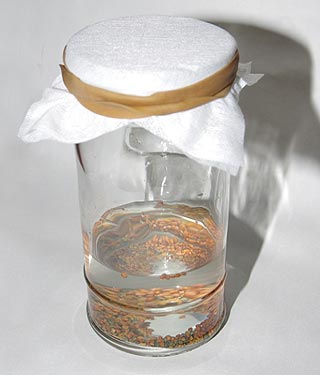What is a sprouted seed?
A sprouted seed is simply a seed that has entered the germination stage.
It has been consumed since ancient times, but the practice has been somewhat lost over the years.
For some time now, we have been rediscovering this healthy and enjoyable way of growing plants, which has many health benefits.
In fact, germination greatly multiplies the amount of vitamins and minerals already present in the ungerminated seed.
What do sprouted seeds contain?
For all their virtues, sprouted seeds are considered a true superfood because their nutritional value is far superior to that of dry seeds.
This is because the combination of water and heat awakens the seed and triggers its enzymatic activity.
During this process, toxic anti-nutrients are killed, while the levels of vitamins A, B, C, D, E and K, minerals such as calcium, magnesium, iron, potassium, phosphorus, etc., and fibre increase significantly.
There are also digestive enzymes that help our body assimilate proteins, lipids and slow sugars.
What are the health benefits of sprouted seeds?
Instead of taking nutritional supplements from the chemist, which can sometimes cost a fortune, taking sprouted seeds according to your needs allows you to combine health prevention with gluttony.
Because, let's not forget, it's really good!
By incorporating sprouted seeds into your diet, you dramatically increase your intake of vitamins, nutrients, minerals and fibre, which are beneficial to the overall metabolism.
We can therefore expect to improve our vitality, strengthen our immune system, lower our cholesterol levels, sleep better, no longer suffer from digestive disorders, etc.
What seeds can we germinate?
Be careful, not all seeds are good for germination.
Some are even poisonous, like tomatoes or aubergines.
Here are some examples of healthy seeds that will sprout:
- Alfalfa: is the star of sprouted seeds, one of the easiest and most complete. It is found in most commercial mixes.
- Wheat: is the most complete cereal (especially in vitamin B1), but also contains all the mineral salts. In addition, sprouted wheat has a very mild, slightly sweet flavour.
- Lentil: Since lentils are very rich in iron, the sprouted version retains this characteristic and remains crunchy.
- Radish: An excellent detoxifier and diuretic, the sprouted seed has a peppery flavour that makes it perfect as a condiment or for seasoning salads.
- Leek: Its very small seed is paradoxically very slow to germinate (about 10 days). What makes it attractive is its superb green colour (which turns neon) and its pungent flavour.
- Onion, spelt, rucola, broccoli, quinoa, fenugreek, caraway, fennel, ...
How do seeds germinate?
If you don't want to germinate your seeds "industrially", you don't need to invest in expensive equipment.
A large jar, some gas cushions and a rubber band will do the trick.

For this first test, you can choose a seed mix for germination that you can easily find in shops or on the Internet.
It is a good mix to discover because the flavour is pleasant and subtle. It is also easy and quick to germinate.
Other than that, nothing too complicated.
Add a tablespoon and cover with water.
This water should preferably be chlorine-free for better germination, so let it stand, filter it or use bottled water.
The duration of this first soaking depends on the type of seed and can vary from 1 to 8 hours.
In general, small seeds should be left to soak for one night and larger seeds for two nights.
At the end of the soaking period, close the jar with a compress, a tulle, a cloth... it doesn't really matter how.
The important thing is that the air can circulate inside.
In practice, just use a "lid" with openings thin enough not to let the seeds escape.
Do the first few washes of your seeds and turn the jar upside down at 45 degrees.
Cover the jar with a cloth to keep it in the dark and let nature take its course.
Make sure you rinse your seeds thoroughly two to three times a day and the first sprouts will appear very quickly.
After 3 days, your first sprouts will be ready to eat after a final rinse (some can take up to 10 days).
If you wait a few more days after germination, your seeds will turn into 'young shoots' with the appearance of the first two green leaflets (leaves).
They will then be richer in chlorophyll and can replace lettuce, for example.
How to eat sprouted seeds?
The uses to which their seeds can be put are limited only by your imagination:
There is only one golden rule to follow when preparing them: do not boil them, as they will lose much of their nutritional value.
- Spice up your salads (with radish, leek or onion seeds).
- Use them as a side dish and to garnish your dishes.
- Add them to your omelettes at the end of cooking.
- As a starter on "verrines" or toast.
- Simply in a sandwich. It's great!
How do I store sprouted seeds?
Store your sprouted seeds in a well-drained jar without a lid to allow them to breathe, and in the fridge so that the cold stops them germinating.
To avoid wasting your seeds and your time, I advise you not to prepare too much in advance, as it is a completely natural, living food and therefore the nutritional qualities deteriorate quickly.
It is also advisable not to exceed a maximum storage time of 5 days.

